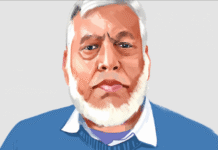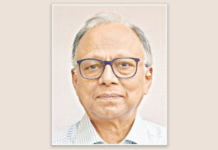The Awami League government came to power 6-7 years ago, as the harbinger of change. And changes have been made. There’s digital Bangladesh. All government office services can now be availed in the comfort of one’s home. Banking transactions, shopping, booking tickets online in this busy Eid bustle, what could be better?
Crowding around school and college notice boards is also no longer necessary to find out examination results. Smartphones offer anything from Facebook to Skype and more.
But a new element of change has entered the scene, too, – change in allegiance to parties.
The police arrested an upazila BNP leader in Raozan, Chittagong, on Sunday. He was accused of killing a Raozan Jubo League activist. There were a few other cases against him, too, according to the police.
But he was released the very next morning. In the afternoon he was taken to the upazila Awami League office where, bouquet in hand, he changed his allegiance. He voluntarily joined the Awami League!
Earlier, on Thursday, a Krishak Dal leader accused of setting fire to the Charghat voting centre in Rajshahi, presented a bouquet to state minister for foreign affairs Shahriar Alam and joined the Awami League. Even a supporter and activist of Jamaat left his party to join the Awami League.
If the government is supposed to be so alert against petrol bombs, arson and violence, how could a state minister of the government allow the BNP and Jamaat people enter the party?
The ruling party has said if there are cases against these people, the law will take its own course. So why are they leaving the BNP to join the Awami League? Law will proceed on its own accord. But if the government is not interested, is there any doubt of the consequences of these cases? If it serves their purpose, the cases will simply slip back into the files.
The dailies have carried more such reports of changing party loyalties. Under fear of cases, threats of arrest, pressure from local powerful political groups, many local BNP and Jamaat leaders and activists are joining the Awami League. It’s a matter of survival.
Surprisingly, the Awami League’s central leadership has not taken any stand in this regard. The prime minister uttered words of caution in this connection recently, but that’s about it. It would be expected that a party with a historical tradition like the Awami League would be more conscious against such opportunism. But such depth of thought has been missing.
On Tuesday I asked Prothom Alo’s Rajshahi correspondent about the reaction to such changes in party affiliation. He said the local Awami League leaders were frustrated and angry. They are asking how the BNP-Jamaat leaders are being taken into the party fold after they had used violence and exploded bombs to injure the Awami League people? A rickshaw van driver had been injured so seriously in an explosion and he still has not recovered fully. The state minister had given him Tk 50,000 for treatment. He is grateful for that, but he cannot cycle his van properly anymore. So how does he feel when he sees the people responsible for his predicament, being ushered into the ruling party? What will the Awami League say to comfort him?
Changing parties is nothing new. This happens in politics. A few leaders and workers here and their change sides, naturally for some benefits. Why else would they change? But there are certain rules. A party cannot just take in anyone from a different party into its own fold immediately. A bouquet is not enough, he will have to have primary membership first. He has to work for two years at least as an activist before he can be taken into any committee. The higher committees will have to endorse. But who bothers about such details? Local leaders and activists just strive to pull in people from the opposite camp. It is about numbers. They take full advantage of the vulnerability of the BNP-Jamaat people. They may be joining now, but when tables turn, so will they.
In the 1960s, the Awami League leaders and activists suffered all sorts of oppression, imprisonment and torture under the Ayub-Monaem rule. They had incomparable contribution towards the party and the country. Bangabandhu Sheikh Mujibur Rahman spent most of his life in and out of jail, struggling for Bengali’s independence rights in the face of all oppression. It was under his leadership that we gained independence. The party leaders and workers today have forgotten the ideals and sacrifices of the party he built up. Where are all these ideals when they welcome Jamaat leaders into the party?
When principles are compromised, principled leaders and activists of the party fall behind. This does not bode well for the party. The opportunists within their party gain an upper hand. Today Chhatra League leaders go to collect toll from the BUET canteen, Titumir College Chhatra League leaders fight with the traders for free food. All these are indications of decay. The party has to take a firm stand about all this.
Any effective political opposition has been virtually wiped out. None of the BNP’s main leaders are able to be active in politics. Most of them have been placed behind bars. Those outside of jail are being kept under such pressure, they are unable to do or say anything. As for parliament, the less said the better. The opposition there is just an extension of the government.
The BNP is gripped with frustration, particularly in the districts and upazilas. Many of them feel it is prudent to join the Awami League, for the time being at least.
Efforts to coerce and corner the opposition through oppression and repression have never worked out in Bangladesh. In 2001 the BNP did the same when it came to government, trying to defuse the opposition through oppression. But it was to no avail. The Awami League has a strong grassroots base which cannot be wiped out by imprisonment, torture or killings.
Today the Awami League has absolute power. If they follow the BNP’s strategy, how do they know it would not boomerang? The Awami League would not be able to strengthen its party by inducting a few BNP leaders and activists into its fold. These will prove to be a burden for the party one day.
Changing parties will hamper the commitment to change. The sooner the Awami League realises this, the better.
Source: Prothom Alo









